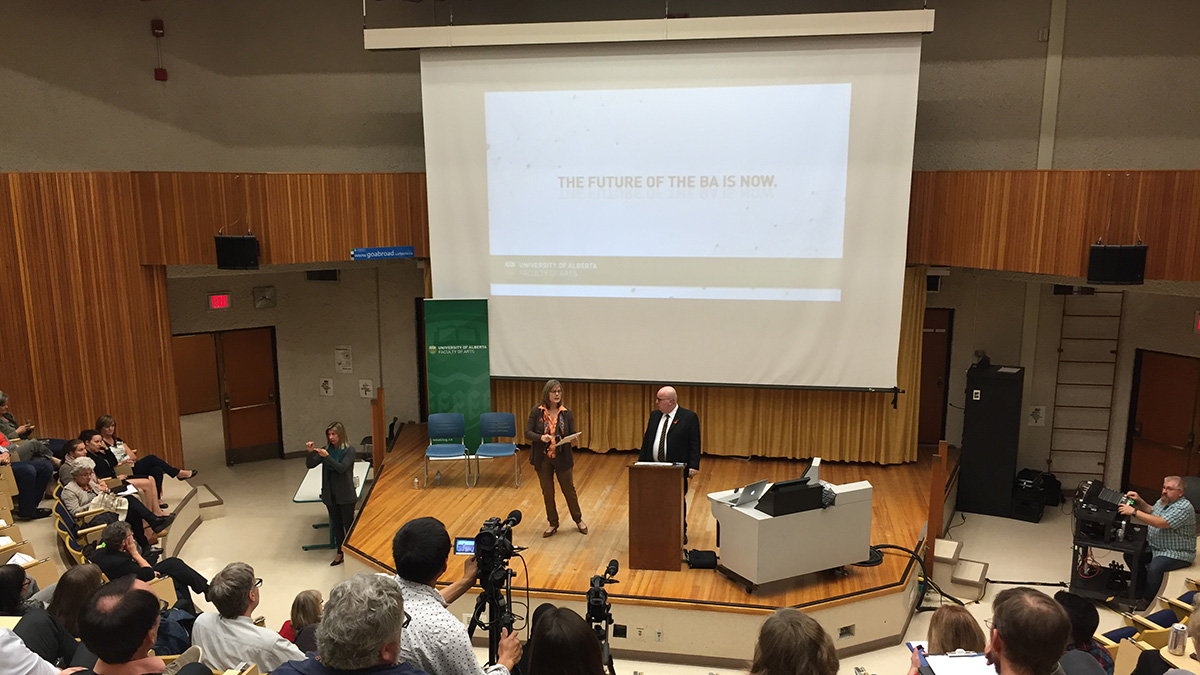Here’s what you need to know about the new BA
 Ashton Mucha
Ashton MuchaA set of changes to remove some of the Bachelor of Arts’ core requirements and increase the degree’s flexibility are currently going through the approval. To succeed, the proposal will have to be passed through Arts Executive Committee on November 3, Arts Faculty Council on November 24, and finally, General Faculties Council in the Winter of 2017. If approved, the changes will take effect Fall 2018.
That being said, here’s what students need to know about the potential future of liberal arts at the University of Alberta:
Changes to the BA core:
[themify_col grid=”2-1 first”]Current requirementsSix credits of English or writing classes
Six credits in each of: fine arts, cultures, and social sciences
Six credits of Science courses
Must have one minor
[/themify_col][themify_col grid=”2-1″]Proposed requirementsThree credits of English of Writing classes
No fine arts, cultures, and social sciences requirements
Six credits of non-Arts courses
Can have a minor, no minor, or a double minor
[/themify_col]Why change the degree?
The changes to the core requirements are being made to make the Arts degree more appealing to students contemplating going to the U of A, Ball said. In the past 10 years, enrollment in the Arts has dropped by six per cent, which Associate Dean of Arts Allen Ball, the project leader, calls a “worrying trend.” In the meantime, the population of metropolitan Edmonton has increased by 30 per cent. And as university costs go up, Ball said faculties have to balance cutting resources in some programs.
Ball said surveys of students who declined offers from the U of A compiled by the Office of the Registrar showed that students weren’t coming to the U of A for a number of reasons, but the exact results were confidential and were therefore not shown to faculty at the town halls.
“We think by doing this the students benefit because of the flexibility and programs benefit because they can attract and retain students,” Ball said. “Right now, we have so many core requirements that you can’t even finish them in the first year. Is that a good idea? When you look at the numbers it suggests that there’s something structurally going on.”
But some professors think that enrollment isn’t that big of a problem. Russell Cobb, Associate Professor of Modern Languages and Cultural Studies, said the downward trend in Arts enrollment isn’t exactly the “crisis situation that people point out.”
“The underlying assumption to (the BA renewal) has been, ‘Oh my gosh, our numbers are slightly decreasing. How do we get them back up?’” Cobb said. “Is there a god out there saying, ‘If you don’t increase numbers in Arts, the whole universes will explode and humanity will cease to exist.’? No.”

Cobb said the degree needs revision at some point, but building a new program based on what will bring in students isn’t the way to do it. He’s also not convinced there’s enough data to back up the changes to the BA.
“We’re often told that the underlying thing with the reform is that students are choosing other programs over ours because they have more flexibility at Calgary, or some other place,” Cobb said. “If there are numbers to back that up, I want to see.”
Primary concerns
It hasn’t been an easy road for the new BA; the whole revision process started in 2011 and the proposal is still meeting resistance. In the spring of 2015, a proposal started to make its way through the approval process, only to be voted down at Arts Executive Committee.
While some stakeholders have said that increased flexibility will be a positive change for the Arts degree, skepticism has also been expressed in town halls in February, March, and October.
Stakeholders have voiced concern about:
- The lack of advising in Arts and a need for better advising in a more flexible program
- A lack of research and data behind the exact cause of the drop in enrollment
- The possibility that reducing requirements will make the meaning of the BA less clear
- The reduction of an English requirement not giving students a solid base in the university’s language
Other stakeholders have voiced support for:
- The increased flexibility of the degree which would students to pursue their interests
- The lessons students will learn in picking their pathway through their degrees
- The reduced requirements would make it easier for students to transfer to the U of A
Currently, the Faculty of Arts advises students over online degree checks and over the counter at the Undergraduate Student Services desk, with no sit-down advising available. Departments also have advisors that can “can assist with specific program and course questions.”
On flexibility and advising
As an alternative to having a more structured core, the BA degree will come with five “thematic pathways,” which would give students a suggested set of courses to take in certain interest areas.
The interest areas and the pathways haven’t been decided yet. If the BA proposal passes, the pathways will be written up in the next year. Professors at the town halls, however, said that a more flexible degree would need to come with more advising from faculty or staff to give students direction in their degrees.
Assistant Professor of Film Studies Jaimie Baron said the flexibility will work well for some students, but that it could leave others hanging. She sees the BA’s current requirements as still being quite broad already, and encourage students to try different disciplines out and “get a more rounded education.”
“There was a student at a town hall who spoke about taking a course because it was required but then discovered a great love for that subject,” Baron said. “I think that happens all the time.”
Ball said the thematic pathways will be the solution to the advising problem that students and faculty were concerned about with the more flexible model.
Some professors and students have disagreed with having more flexibility and fewer core requirements, while others expressed concern at the removal of the Fine Arts requirement.
In the town hall, a professor in the Department of Fine Arts said he would have never taken his career path if he hadn’t had a fine arts requirement during his undergraduate years. Meanwhile, professor Allen Ball, Associate Dean and Associate Professor of Fine Arts says students shouldn’t have to take a fine arts requirement.
“Even in the current system, students have the choice of taking music, drama, or art and design,” he said. “Students can still avoid drama. They still can avoid music if their wanted to.”
Besides Fine Arts, professors at the most recent town hall also voiced concern about the reduction of a writing requirement. Baron said the current system of teaching introductory English to classes of 40 isn’t ideal, but that “cutting the requirement in half” isn’t the answer.
“One of the most important things for students to learn in university is how to write well,” Baron said. “If you come out of university without good writing skills, I think you’re setting yourself up for failure. Cutting the requirement just exacerbates a problem that we already have.”
Ball also defended the removal of an English or Writing Studies course requirement by arguing that writing should be taught across all courses in the university. English professors at the town hall in September, however, said that English should be taught to give students a more robust introduction to the language — especially for international students.




